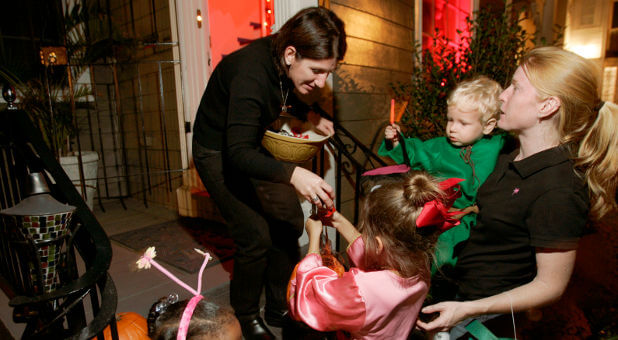What about Halloween?
Should you and I be involved in the celebration of Halloween?
Finding the answer to this question has been an interesting journey in itself. I interviewed several people and then researched what many leading Christian writers, authors and spokesmen have written about the subject. I also searched various websites such as christianitytoday.com, focusonthefamily.org, and cbn.com to read what others might be saying. What I found was an agreement on the origins of Halloween, but a mixture of recommendations about allowing our children to participate in this super-charged media driven holiday.
The origins of Halloween are Celtic in tradition and have to do with observing the end of summer sacrifices to gods in Druidic tradition. In what is now Britain and France, it was the beginning of the Celtic year, and they believed Samhain, the lord of death, sent evil spirits abroad to attack humans, who could escape only by assuming disguises and looking like evil spirits themselves. The waning of the sun and the approach of dark winter made the evil spirits rejoice and play nasty tricks. Believe it or not, most of our Halloween practices can be traced back to these old pagan rites and superstitions.
But what about today? Perhaps we can still learn from history. In the fourth century, Christians attempted to co-opt the holiday by celebrating the lives of faithful Christian saints the day before Halloween. This was a conscious attempt to provide an alternative and refocus the day away from ghouls, goblins, ghosts, witches and other “haunted” experiences. Since that time many Christians have decided to allow their children to dress in more “innocent” costumes of pumpkins, princesses, Superman or as a cowboy. Part of this is due to the simple reality that in today’s Western culture it is nearly impossible to “avoid” Halloween.
Just before reaching a conclusion on the subject, I was struck with the thought that I ought to further my search and find out what Wicca, the official religion of witchcraft, has to say about Halloween. Perhaps they viewed the day as simple fun and innocent neighborhood activity?
“Shock” is the only word to describe what I found. Halloween is a real, sacred day for those who follow Wicca. In fact, it is one of two high and holy days for them. The Celtic belief of spirits being released is current, along with the worship of Samhain (the lord of death)—both are promoted as something to embrace on that day. There is no question in my mind that to those who believe and follow the practices of witchcraft, Halloween represents an opportunity to embrace the evil, devilish, dark side of the spiritual world.
So after discovering this, what is a reasonable conclusion? As Christians you and I are placed in this world to be a light in a world of darkness. There is no lasting benefit to ignore a holiday that exists around us, but it also does harm to celebrate Halloween as it has originated and grown over the centuries.
My suggestion? Christians should be teaching their children (age appropriately) that:
- there is a spiritual world filled with goodness from God and evil from Satan (Eph. 2:1-10);
- life with Christ has power over darkness (I John 4:4); and
- those who celebrate Halloween either are unaware of its roots, or are intentionally promoting a world where evil is lauded and viewed as an ultimate power.
To counter the evil influence of Halloween, we need to join together and celebrate the reality of the heroic efforts of Christian saints over the evil in their day. Many leaders in the past—and present—have fulfilled the mandate of destroying the works of the devil through their sacrificial commitment to Christ and His Kingdom.
Too, rather than “hide” in the face of evil, we should unabashedly and boldly create an alternative that is positive and uplifting; that celebrates good over evil and the triumph of God over Satan. We need to provide an environment that also makes room for heaps of fun while using the day as a “teachable moment” to celebrate God’s protection, provision and purpose for our lives.
More from CBN.com’s Halloween Resource Section











































